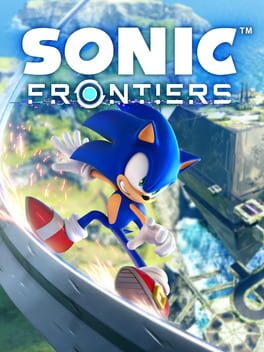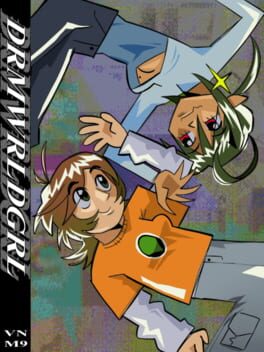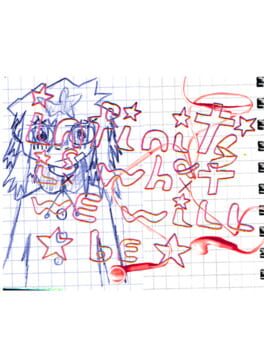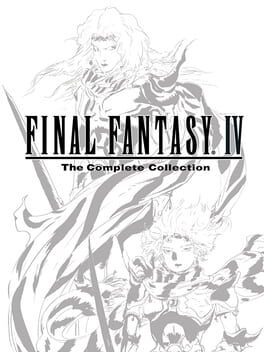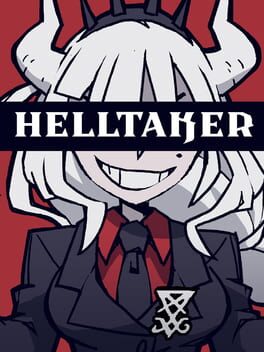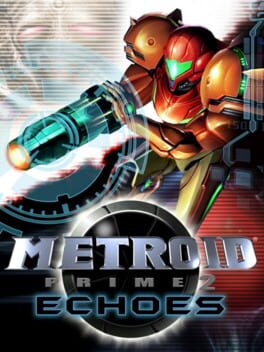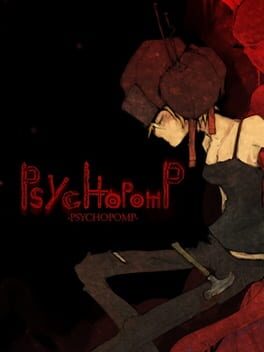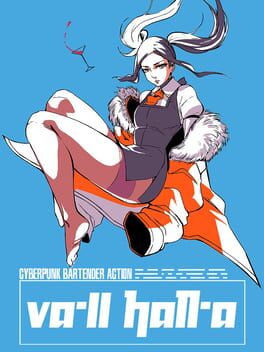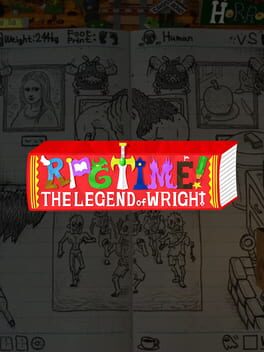CallingGestalt
2020
Crazy how they released a 2012 Tumblr RPG Maker game in 2020/2022.
This game is just kinda okay. I really liked the Real Life and the final act, but that's kinda disconnected in relation to the rest of the game and kinda sparse. Similarly, the battle system and the writing is technically good, but also just kinda there. The rest is just fluff to me. Altogether to game is boring and not all that worth playing.
This game is just kinda okay. I really liked the Real Life and the final act, but that's kinda disconnected in relation to the rest of the game and kinda sparse. Similarly, the battle system and the writing is technically good, but also just kinda there. The rest is just fluff to me. Altogether to game is boring and not all that worth playing.
2022
Sega: "I got a present for you. It's a little dirty. A little rough around the edges, just like your dear old ex con game company with a heart of gold."
Sonic Frontiers is a Video Game. A game that carries the sentiment I've missed of true soul, of wanting to just make something. And while all its parts don't fit together perfectly, they do mesh well enough that I enjoyed my time with this.
The open worlds are a bit weird and somewhat empty, but I also found it fun to worm my way through it and hit all the challenges. The combat isn't that complex, but it felt cool to figure out how to solve different enemies and bosses. The cyber space levels really aren't much, but when you're going through them for only a minute on a good run and seeing the various gimmicks they try, I don't mind that there are only 4 environments.
The game is 100% something that could have used more time and money, but with the game play and story I had fun with, I'm glad I played it and am anticipating how this will be iterated on.
Sonic Frontiers is a Video Game. A game that carries the sentiment I've missed of true soul, of wanting to just make something. And while all its parts don't fit together perfectly, they do mesh well enough that I enjoyed my time with this.
The open worlds are a bit weird and somewhat empty, but I also found it fun to worm my way through it and hit all the challenges. The combat isn't that complex, but it felt cool to figure out how to solve different enemies and bosses. The cyber space levels really aren't much, but when you're going through them for only a minute on a good run and seeing the various gimmicks they try, I don't mind that there are only 4 environments.
The game is 100% something that could have used more time and money, but with the game play and story I had fun with, I'm glad I played it and am anticipating how this will be iterated on.
2023
This review contains spoilers
All art is a form of communication. People putting out an abstract message that viewers will need to take the task of understanding. "Moon" makes the player do this through gamifying the desire to understand people. But in the end, it is only a game. You can only apply so much life and desire to code. So, the only way to win a game about understanding other people is to go out and do it in real life.
Lovedelic making a game just to say "go outside":
"Moon" is such a unique experience. It's one of the least stressful games I've played whilst also feeling like it has a lot of depth to it's game play and what you are actually doing. I can point to handful of games that do this or that which is similar, but they aren't Moon. Moon is kinda a game that didn't want to sit with game play conventions and just wanted the player to explore it's world and enjoy themself.
Lovedelic making a game just to say "go outside":
"Moon" is such a unique experience. It's one of the least stressful games I've played whilst also feeling like it has a lot of depth to it's game play and what you are actually doing. I can point to handful of games that do this or that which is similar, but they aren't Moon. Moon is kinda a game that didn't want to sit with game play conventions and just wanted the player to explore it's world and enjoy themself.
As the first step up in new capabilities of Role Playing Games, this is charming until it isn't.
A quality of Final Fantasy IV that shines throughout the game is the sense of boundaries being broken. Bosses could have multiple sprites, dungeons could have layers to hide secrets, party composition could change, characters could each have their own abilities that brought something new to a battle, even sprites could be moved around to elicit a form of acting. All throughout the game, there are so many qualities that might seem simple today but are so clearly amazing advancements for the time it would have been released.
The story isn't too special. There are more character "deaths" then there are interesting plot developments, but the mere idea that these dots on a screen were characters with a history that had motivations and could develop would have been amazing to see. That said, there still isn't that much that's going on. The events and plot are basically cyclical until the end when things just kinda work out. As you might expect, this gets grating after a while, and by the end, the reveals would seem cool if they had much of anything behind them.
The game ends up sharing a similar sentiment. It's really awesome that these characters all have their own special ability, and each part of the game ends up feeling just a bit different from the last because of how your party composition ends up. Seeing these classic jobs be a thing in universe attached to their own character is neat. Even having the main character change his job completely is cool until you're at the end game and your party hasn't changed or developed much at all past their basic roles. Your main character gets the ability to cast spells but stops learning after 5 so you're at the final boss with a status effect healer as the best thing he can offer. At this point also, the game's only way of challenging you is to use attacks that hit for most of your HP or outright kill party members.
Despite this, the game is mostly fine. It being the first SNES Final Fantasy speaks for its quality. There is a roughness around the edges but also a lot of cool concepts that needed to be built upon, it's the middle ground between the simplicity of FF1 and the mastery of FF6.
A quality of Final Fantasy IV that shines throughout the game is the sense of boundaries being broken. Bosses could have multiple sprites, dungeons could have layers to hide secrets, party composition could change, characters could each have their own abilities that brought something new to a battle, even sprites could be moved around to elicit a form of acting. All throughout the game, there are so many qualities that might seem simple today but are so clearly amazing advancements for the time it would have been released.
The story isn't too special. There are more character "deaths" then there are interesting plot developments, but the mere idea that these dots on a screen were characters with a history that had motivations and could develop would have been amazing to see. That said, there still isn't that much that's going on. The events and plot are basically cyclical until the end when things just kinda work out. As you might expect, this gets grating after a while, and by the end, the reveals would seem cool if they had much of anything behind them.
The game ends up sharing a similar sentiment. It's really awesome that these characters all have their own special ability, and each part of the game ends up feeling just a bit different from the last because of how your party composition ends up. Seeing these classic jobs be a thing in universe attached to their own character is neat. Even having the main character change his job completely is cool until you're at the end game and your party hasn't changed or developed much at all past their basic roles. Your main character gets the ability to cast spells but stops learning after 5 so you're at the final boss with a status effect healer as the best thing he can offer. At this point also, the game's only way of challenging you is to use attacks that hit for most of your HP or outright kill party members.
Despite this, the game is mostly fine. It being the first SNES Final Fantasy speaks for its quality. There is a roughness around the edges but also a lot of cool concepts that needed to be built upon, it's the middle ground between the simplicity of FF1 and the mastery of FF6.
2020
It's the fun little puzzle game I thought it would be. The art and game play are cool, but there isn't much there, but it's free so I can't complain. I get the idea that there could be more done with this game concept, like the Examtaker expansion does some new puzzle concepts and some sort of story.
2024
Another ADV game I will shill. The character writing isn't just good, it has this bespoke, humanness to it that makes it feel like you aren't just reading something from some weirdo cast of characters. PS4 controls are a bit finicky but not in the way. The characters all have this purpose in showing something about relationships or mental health that doesn't feel like someone just wanting to have something meaningful come out of a specific type of character. All the characters seem real.
2022
So, it hurts a bit more the second time.
With the story and gameplay that this game has, a second playthrough where everything is sitting in the front of your mind is destined to be smoother. Items you had no thought in now aren't skipped over or stashed away, navigation and puzzles are that much easier as you've already seen the areas and solutions before, and those little things that didn't add up are staring you in the face.
Coming back to the start of the story after getting the sparse details it gives and connecting some dots around what it all means paints a different picture of what was going on... even if it wasn't exactly subtle in what it was originally setting up. It's blatant that this is a time loop story and having a full view of the mechanics and setting of the world makes everything even clearer. Which then leaves all the murky spots all that much worse when you still don't have that full a picture.
With the story and gameplay that this game has, a second playthrough where everything is sitting in the front of your mind is destined to be smoother. Items you had no thought in now aren't skipped over or stashed away, navigation and puzzles are that much easier as you've already seen the areas and solutions before, and those little things that didn't add up are staring you in the face.
Coming back to the start of the story after getting the sparse details it gives and connecting some dots around what it all means paints a different picture of what was going on... even if it wasn't exactly subtle in what it was originally setting up. It's blatant that this is a time loop story and having a full view of the mechanics and setting of the world makes everything even clearer. Which then leaves all the murky spots all that much worse when you still don't have that full a picture.
2018
Neat game about going through it.
I'm coming to the party a bit late, so most of what I knew about this game before playing it was that it was something that was a "trans people game." Looking at it you might think that it means that it's going to be a Wholesome 100, Feelsie game about transitioning or something, but it really isn't. The game is pretty genuine about the idea of people having different struggles and the difficulty of what it takes to get through them, even having a fake out “your parents just don’t understand you” scene. It’s hard to get through whatever you’re going through (the game is pretty vague about Madeline’s problems specifically, which I think helps in sympathizing with the game’s concepts), but being with other people, wherever you can find them, helps. At the same time, you need to be willing to accept the problems you do have and not just push them down in hopes you’ll be better for it. That all said, there’s only so much I can say about the story as there’s only so much of it. The game says what it wants to say and not much more. The gameplay on the other hand has a lot more than the initial run through.
One of the strengths of indie games is that the simpler game concepts can often be explored in so many different ways without also feeling like they were drawn out too long. Basically every 45 minutes or so, you’ll have some new mechanic on top of jumping, dashing, and holding. Add on different aesthetics for each chapter, the whole game felt fresh and kept me interested the whole 7 hours it took me to go through the main campaign. With there being even more optional stages and collectables, this could be a game someone could really engross themselves into.
Overall, a pretty good game that ended up being a lot different from what I was expecting but not overwhelming. Madeline is just like me, fr, though.
I'm coming to the party a bit late, so most of what I knew about this game before playing it was that it was something that was a "trans people game." Looking at it you might think that it means that it's going to be a Wholesome 100, Feelsie game about transitioning or something, but it really isn't. The game is pretty genuine about the idea of people having different struggles and the difficulty of what it takes to get through them, even having a fake out “your parents just don’t understand you” scene. It’s hard to get through whatever you’re going through (the game is pretty vague about Madeline’s problems specifically, which I think helps in sympathizing with the game’s concepts), but being with other people, wherever you can find them, helps. At the same time, you need to be willing to accept the problems you do have and not just push them down in hopes you’ll be better for it. That all said, there’s only so much I can say about the story as there’s only so much of it. The game says what it wants to say and not much more. The gameplay on the other hand has a lot more than the initial run through.
One of the strengths of indie games is that the simpler game concepts can often be explored in so many different ways without also feeling like they were drawn out too long. Basically every 45 minutes or so, you’ll have some new mechanic on top of jumping, dashing, and holding. Add on different aesthetics for each chapter, the whole game felt fresh and kept me interested the whole 7 hours it took me to go through the main campaign. With there being even more optional stages and collectables, this could be a game someone could really engross themselves into.
Overall, a pretty good game that ended up being a lot different from what I was expecting but not overwhelming. Madeline is just like me, fr, though.
2022
A mostly Neat Game. Having separate characters that have different game play mechanics and stories was cool, and how everything ties together and the final boss was awesome. Just wish the last chapter didn't become a generic RPG that had me grind and has bad optional dungeons for me to do to have a chance at beating the final boss. Not to mention that the battle system can be lengthy and you can't skip skill animations. Despite having a new coat of paint, Live Alive is still a SNES RPG.
2022
When the Girlies experience existential horror 🤭🤭🤭.
One of the first games I've seen replicate the PS1, limited polygons and resolution, but full cinematic direction type of presentation. Not only that, it's an amazing synthesis of the era's ADV + Survival Horror catalog. Yuri is a central plot point.
One of the first games I've seen replicate the PS1, limited polygons and resolution, but full cinematic direction type of presentation. Not only that, it's an amazing synthesis of the era's ADV + Survival Horror catalog. Yuri is a central plot point.

